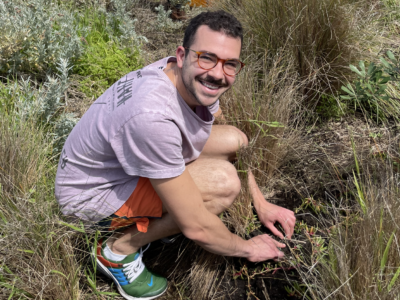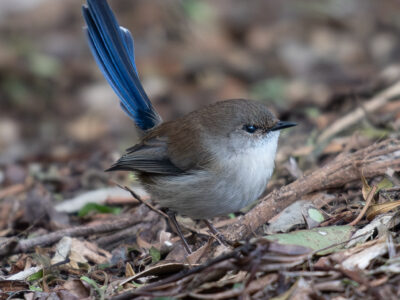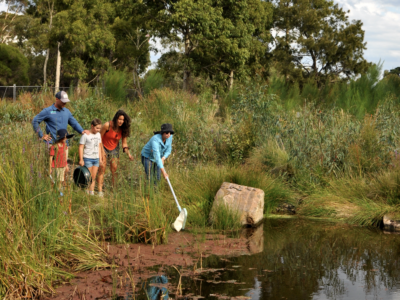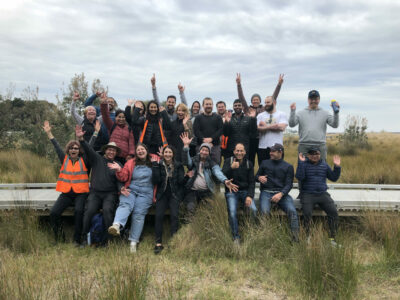by Vanessa Shambrook, Impact Team Leader
We live on a blue planet, with oceans and seas covering more than 70 per cent of the Earth’s surface. Our oceans and seas are a vital part of planetary health and help regulate our climate, feed us, support our economy and provide roughly half of Earth’s oxygen. Today we celebrate World Ocean Day.
Port Phillip EcoCentre remains committed to protecting oceans, rivers and bays as a recognised member of the global Waterkeeper Alliance. Across six continents, grassroots ‘Waterkeepers’ advocate for clean, healthy and abundant water for all people and the planet, and support improved protection to water systems.

We recently partnered with leaders around the world to urge United Nations Water to protect our natural water systems as a basic human right.
The EcoCentre and fellow Waterkeeper organisations signed onto a Declaration which was presented at the United Nations Water Conference.
However, the latest data from UN Water demonstrates that governments globally need to work on average four times as fast to meet the United Nations Sustainable Development Goal (SDG) 6: to improve water quality by reducing pollution and increase water-use efficiency.
Through science and advocacy, our Port Phillip Baykeeper Neil Blake OAM is a crucial player in protecting the health of Port Phillip Bay (Nairm), the largest Bay in Victoria and a vital part of the Great Southern Reef.
The Great Southern reef has an exceptionally high percentage of uniquely local species (scientifically known as endemic). It is estimated that around 80% of species found in the Great Southern Reef are endemic.
Your Baykeeper also monitors the impacts of climate change. Rising sea levels and changes in weather patterns are already impacting Victoria’s marine and coastal ecosystems. This shows up in numerous ways, including:
• habitat pressures for shellfish (filter-feeders who clean our water)
• losing days of safe swimming after storm floods rush urban pollution to beaches
• and infrastructure quickly becoming absurd.

Baykeeper Neil works closely with community groups around Bay coastlines to consider appropriate action to prevent and mitigate climate change impacts, based on data collected through beach profiling studies that monitor sea levels, dune health and sand erosion. Based on methodical observations over time, we are deeply concerned that, without the urgent adoption of appropriate management strategies, significant Indigenous cultural and environmental values will be lost.
Water bodies worldwide face similar predicaments. We hope that the joint Declaration will influence the UN to prioritise protecting natural water systems. Pollution, habitat loss, dams and water diversions all threaten viability of thriving ecosystems that support biodiversity, fisheries, access to clean water, traditional harvest and Indigenous practices, wildlife habitat and climate control.

We are celebrating new ocean protections and ask Australian Government to ratify and implement them urgently.
An international treaty was agreed in March 2023 and became the first international law to offer some protection to around 30% of the high seas (oceans beyond national control) by 2030. This Treaty limits activity in our deep seas to only those which do not damage marine life. This represents unprecedented, meaningful protection against overfishing, pollution and habitat destruction.
High seas make up 60% of the Earth’s surface and nearly half of the planet’s surface, but only around 1% of them were previously protected.
This Treaty will play a role in building resilience to the impact of climate change and in efforts to reverse marine biodiversity losses globally.
The Port Phillip EcoCentre commends the Australian Federal Government recently supporting the High Seas Treaty (‘the Treaty’).
On World Ocean Day we urge the Australian Government to quickly ratify the Treaty, followed by implementation into local legislation. Without this important step, protections are not truly enforceable.
Any treaty sits within a context of wider legislations and policies, and laws within each nation. This means the Ocean Treaty alone cannot not protect oceans fully – for example, the Treaty’s provisions do not overrule existing regulations that oversee high seas activities (such as existing fishing and commercial shipping, deep-sea mining or military operations). Nor will the Treaty end current offshore environmental violations such as pollution from plastic and farming waste, which ends up in rivers and coastal waters.
Does this compromise the win? No: we celebrate the significant step forward. However, the EcoCentre team will continue to advocate for a range of complementary laws, policies and industry best practices, from local to international scales.
Further, we can support the enforcement the Treaty once it has been ratified, as Australia needs to report periodically to the UN Convention on the Law of the Sea. To do this, the EcoCentre expects to lodge reports involving national environmental concerns, including observed Treaty breaches, to relevant government departments and enforcement agencies.
The role you can play for healthy oceans and our Bay
We cannot achieve these protections without you – joining citizen science, starting conversations and signing onto advocacy efforts. We must build on this momentum to see off new threats and focus on putting protections in place for our oceans, waterways and bays for the long term.
Three ways you can support today:
1. With 2 minutes: Sign the Ocean Foundation’s petition to encourage world leaders to act.
2. With 2 dollars: Consider a tax-deductible gift to support your Baykeeper team.
3. With 2 hours: Join a Baykeeper citizen science team! Next up: PestWatch! Training 10 June.




